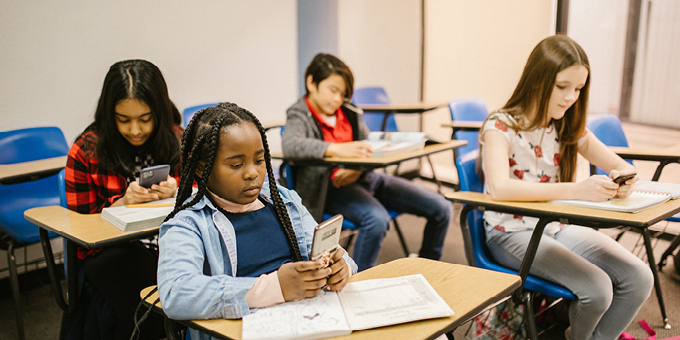According to the Ormiston Academies Trust, phones had a ‘catastrophic’ impact on learning and mental health.
A national academy chain of 35,000 students is the first in England to ban students from using smartphones during the day due to their “catastrophic” impact on children’s learning and mental health.
The Ormiston Academies Trust, which manages 44 state schools, including 32 secondary schools, began banning smartphones and devices at all 35,000 of its schools nationwide. After liaising with parents, eight secondary schools have started adopting new policies this term, and the rest are yet to come.
The decision resulted from the move by policymakers and school leaders across the globe to consider tougher restrictions on how children use and interact with smartphones and devices. Global restrictions include the recent policies by the French government to ban the use of internet phones by children under 13 and only permit social media usage for children above sixteen years old.
The Ormiston’s chief executive, Tom Rees, said the status quo in most schools, permitting students to keep their phones during the school day, wasn’t an adequate response to the disruption phones cause students’ learning and well-being as a whole.

He stated, “We are seeing vast and real concerns around mental health, post-pandemic. These are not just self-reported; we’re also seeing real concerns about self-harm, attempted suicide, and A&E admissions – these are facts from across the world involving young people and adolescents.
“We see a clear correlation between that and mobile phones and social media use. Not all mobile phone use is equal, and the relationship between that and adolescent mental health, we think, is overwhelming.
“There is a responsibility for society to respond, and a responsibility for schools to make it harder for children to access inappropriate content through the school day and restrict the draw of social media.”
According to Rees, Ormiston’s primary, special needs, and alternative provision schools have banned students’ phone access; however, tougher policies are needed across its secondary schools to improve learning.
He added, “Learning can’t happen without attention. Much of this is about a battle for attention, focus, and concentration. It’s not just about having your phone out and using it; it’s the phone’s mere presence.
“There’s evidence that tells us that even if your phone is in the same room, it could be in your bag or pocket, your brain is leaking attention, still thinking about it and being drawn to it, wondering if there has been a notification on it and what it might be.
“That is impacting young people’s ability to learn, to retain information, to concentrate, to focus. An increasing distraction is catastrophic for the process of learning, and that’s true both at school and at home.”
The secretary of technology, Peter Kyle, stated that he was open-minded about Australia’s decision to ban social media for children under 16. He told the media, “It is making some young people increasingly vulnerable. We don’t have yet much evidence about what action makes a big difference in response or is indeed effective. So, I’m looking very closely at the Australian experience, and I’m open-minded. I would do anything to keep young people safe.”
The peer and former health minister, Ara Darzi, also told the Times that there is a needed action for youngsters’ access to social media. He stated, “109,000 kids are waiting for mental health support. It’s just awful; that’s the future generation. These are the kids who will produce the journalists, the doctors, the nurses. It’s frightening.”
“If anything could be done on social media on a personal basis, I will vote for it, no question about that. I don’t know the solutions but we have to have some controls on access to some of the materials you can get access to on social media.”
An adviser to the Department for Education on behaviour policy stated that Ormiston’s phone-free policy was the most ambitious he had encountered and part of the national and international trend toward tougher restrictions.
He stated, “Culture has finally caught up with technology, and the evidence base has now confirmed what many people suspected for a long time—that mobile phones are a severe detriment to children’s learning, probably their mental health and well-being, and even their safety when they are unsupervised.
“The school environment is very much about focus, motivation and thinking hard about things. Mobile phones promote the opposite: grazing, superficial thinking and novelty and entertainment, which is why we now know the negative effect that mobile phones can have.”
Bennett went on to say that “one of the simplest things any school can do is to completely ban their use” unless in “permitted circumstances”, such as students commuting to and from school.
He stated that he went to several schools each week and noticed more students “waking up to the reality” of the impact on their lives. Most schools have a mobile phone policy that involves some type of restriction, but I see many schools that don’t enforce those policies very thoroughly, which means phone access is still easily available in toilets, in social spaces or corridors, or during breaks.
“The wise school restricts even these times and makes sure that all teachers are supported to know how, when and why they are confiscating mobile phones.”















